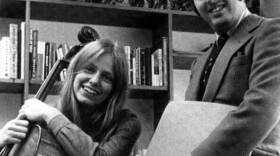Thomas Elliott: I’ve known Thomas’s family since he was 6-years-old.
Mark: That was Thomas Elliott, violist for the musicians of the Iowa Great Lakes Festival, speaking of the festival's founder and cellist Thomas Fortner. The Thomas’s met in Texas when Elliot and violinist David Brubaker, who was also with me in the studio, were members of the Huston Symphony.
Thomas Fortner: My father was a band director, a high school band director, and then he made a transition into the science world. But when I was really little, you know, he was dying to take me to something and just see how I would react. So he took me to a rehearsal, and I still remember the sights and the sounds. And I think it’s fitting that it was a rehearsal and not just a concert, so it’s like the actual process.
Mark: In the process of growing up, Fortner would spend summers at the Iowa Great Lakes, with the prairie birds and landscapes, Lake Okoboji’s sanctuary from the heat, and family
Fortner: I think the big moment actually happened when I was watching a pre-recorded show of an oompah band, or polka band, that my grandmother taped. And I was like, OK, Grammy, whatever you say, I’ll listen to this, and I started listening, and I was like, “Oh my gosh, this is Mahler and Dvorak, the Landlers, or whatever. And it’s us. I’m Bohemian. And so, in a way, this area feels more like home than even Houston did.
Mark: The theme of place returned throughout our conversation. Where we began, music-wise, was with Dvorak, the composer who also found a home amongst Iowa’s Bohemians. The trio of musicians, who will perform as a quartet at the festival, performed a piece from Dvorak’s “American” quartet.
Fortner: Part of my inspiration for this festival was driving in the van with my family, coming up from Texas every summer to go see the lake and my grandparents, and I would have in my—I guess we would call it a Walkman or CD player, back in the ‘90s—Dvorak playing in it. And it looked like the hills and the corn and the fields, and, apparently, when he came to Spillville, the reason why he came was while he was living in New York, teaching at what became Jiulliard, he was very homesick, and the city life kind of made him very anxious. And so, his secretary said, “Hey, there’s this Czech community, these Bohemian folks, they all speak Bohemian, and it’s out in Iowa, and it looks just like home. You’ll love it.” So, perhaps, people would know the “Humoresque,” (singing tune). And he wrote that in Iowa, and I’m almost 100% certain that it’s a robin: “pretty bird, pretty bird, pretty bird, cheep cheep.” So it’s… this music is coming home in a way.
Mark: Just as all roads lead home, all roads lead away from home. Our story is about movement, and the festival program, in part, tells that story. The musicians will also perform Glass’s fifth string quartet.
Fortner: It’s poetry in motion. I mean, there are not really any moments in that quartet, the Glass Quartet, that there’s not something moving. It’s a lot like being on a road trip. And it’s like the road is constant, but things are slightly changing, and all of the sudden the colors of the leaves and the crops are changing. Somehow there’s… you might see a cow on the side, and somehow that’s a poetic image that gets into your mind.
Mark: As we zipped along in conversation. We touched upon Debussy whose string quartet is featured on the program, and whom Fortner compared to the impressionists of his day as well as the symbolists.
Fortner: So, it’s a lot like that cow on the side of the road. It somehow gives you this… It reminds you of being on the farm with your mother. It’s like you can say three words and it means so much. The thing about the Debussy is that it’s not so many direct objects in the piece; it’s more like for the sake of the sound. Somehow you’re just focusing on the quality of the sound itself.
Mark: The Iowa Great Lakes Music Festival will perform “American” String Quartets and Debussy this Friday at the St. Joseph Catholic Church in Milford. It begins at 7:00 p.m. Find more information at Iowa Great Lakes Music dot org. I was joined by three of the musicians of the festival: cellist and founder Thomas Fortner; violist Thomas Eliot; and violinist David Brubaker. At the end of our interview, Fortner performed the prelude from Bach’s Cello Suite No. 1.






